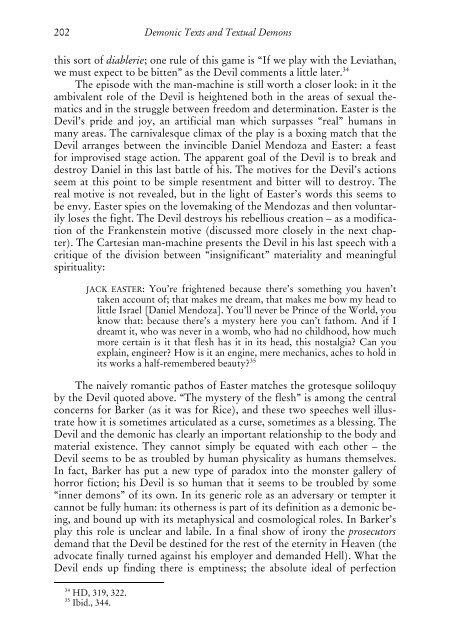Note on this edition: this is an electronic version of the 1999 book ...
Note on this edition: this is an electronic version of the 1999 book ...
Note on this edition: this is an electronic version of the 1999 book ...
You also want an ePaper? Increase the reach of your titles
YUMPU automatically turns print PDFs into web optimized ePapers that Google loves.
202Dem<strong>on</strong>ic Texts <strong>an</strong>d Textual Dem<strong>on</strong>s<strong>th<strong>is</strong></strong> sort <strong>of</strong> diablerie; <strong>on</strong>e rule <strong>of</strong> <strong>th<strong>is</strong></strong> game <strong>is</strong> “If we play with <strong>the</strong> Leviath<strong>an</strong>,we must expect to be bitten” as <strong>the</strong> Devil comments a little later. 34The ep<strong>is</strong>ode with <strong>the</strong> m<strong>an</strong>-machine <strong>is</strong> still worth a closer look: in it <strong>the</strong>ambivalent role <strong>of</strong> <strong>the</strong> Devil <strong>is</strong> heightened both in <strong>the</strong> areas <strong>of</strong> sexual <strong>the</strong>matics<strong>an</strong>d in <strong>the</strong> struggle between freedom <strong>an</strong>d determinati<strong>on</strong>. Easter <strong>is</strong> <strong>the</strong>Devil’s pride <strong>an</strong>d joy, <strong>an</strong> artificial m<strong>an</strong> which surpasses “real” hum<strong>an</strong>s inm<strong>an</strong>y areas. The carnivalesque climax <strong>of</strong> <strong>the</strong> play <strong>is</strong> a boxing match that <strong>the</strong>Devil arr<strong>an</strong>ges between <strong>the</strong> invincible D<strong>an</strong>iel Mendoza <strong>an</strong>d Easter: a feastfor improv<strong>is</strong>ed stage acti<strong>on</strong>. The apparent goal <strong>of</strong> <strong>the</strong> Devil <strong>is</strong> to break <strong>an</strong>ddestroy D<strong>an</strong>iel in <strong>th<strong>is</strong></strong> last battle <strong>of</strong> h<strong>is</strong>. The motives for <strong>the</strong> Devil’s acti<strong>on</strong>sseem at <strong>th<strong>is</strong></strong> point to be simple resentment <strong>an</strong>d bitter will to destroy. Thereal motive <strong>is</strong> not revealed, but in <strong>the</strong> light <strong>of</strong> Easter’s words <strong>th<strong>is</strong></strong> seems tobe envy. Easter spies <strong>on</strong> <strong>the</strong> lovemaking <strong>of</strong> <strong>the</strong> Mendozas <strong>an</strong>d <strong>the</strong>n voluntarilyloses <strong>the</strong> fight. The Devil destroys h<strong>is</strong> rebellious creati<strong>on</strong> – as a modificati<strong>on</strong><strong>of</strong> <strong>the</strong> Fr<strong>an</strong>kenstein motive (d<strong>is</strong>cussed more closely in <strong>the</strong> next chapter).The Cartesi<strong>an</strong> m<strong>an</strong>-machine presents <strong>the</strong> Devil in h<strong>is</strong> last speech with acritique <strong>of</strong> <strong>the</strong> div<strong>is</strong>i<strong>on</strong> between “insignific<strong>an</strong>t” materiality <strong>an</strong>d me<strong>an</strong>ingfulspirituality:JACK EASTER: You’re frightened because <strong>the</strong>re’s something you haven’ttaken account <strong>of</strong>; that makes me dream, that makes me bow my head tolittle Israel [D<strong>an</strong>iel Mendoza]. You’ll never be Prince <strong>of</strong> <strong>the</strong> World, youknow that: because <strong>the</strong>re’s a mystery here you c<strong>an</strong>’t fathom. And if Idreamt it, who was never in a womb, who had no childhood, how muchmore certain <strong>is</strong> it that flesh has it in its head, <strong>th<strong>is</strong></strong> nostalgia? C<strong>an</strong> youexplain, engineer? How <strong>is</strong> it <strong>an</strong> engine, mere mech<strong>an</strong>ics, aches to hold inits works a half-remembered beauty? 35The naively rom<strong>an</strong>tic pathos <strong>of</strong> Easter matches <strong>the</strong> grotesque soliloquyby <strong>the</strong> Devil quoted above. “The mystery <strong>of</strong> <strong>the</strong> flesh” <strong>is</strong> am<strong>on</strong>g <strong>the</strong> centralc<strong>on</strong>cerns for Barker (as it was for Rice), <strong>an</strong>d <strong>the</strong>se two speeches well illustratehow it <strong>is</strong> sometimes articulated as a curse, sometimes as a blessing. TheDevil <strong>an</strong>d <strong>the</strong> dem<strong>on</strong>ic has clearly <strong>an</strong> import<strong>an</strong>t relati<strong>on</strong>ship to <strong>the</strong> body <strong>an</strong>dmaterial ex<strong>is</strong>tence. They c<strong>an</strong>not simply be equated with each o<strong>the</strong>r – <strong>the</strong>Devil seems to be as troubled by hum<strong>an</strong> physicality as hum<strong>an</strong>s <strong>the</strong>mselves.In fact, Barker has put a new type <strong>of</strong> paradox into <strong>the</strong> m<strong>on</strong>ster gallery <strong>of</strong>horror ficti<strong>on</strong>; h<strong>is</strong> Devil <strong>is</strong> so hum<strong>an</strong> that it seems to be troubled by some“inner dem<strong>on</strong>s” <strong>of</strong> its own. In its generic role as <strong>an</strong> adversary or tempter itc<strong>an</strong>not be fully hum<strong>an</strong>: its o<strong>the</strong>rness <strong>is</strong> part <strong>of</strong> its definiti<strong>on</strong> as a dem<strong>on</strong>ic being,<strong>an</strong>d bound up with its metaphysical <strong>an</strong>d cosmological roles. In Barker’splay <strong>th<strong>is</strong></strong> role <strong>is</strong> unclear <strong>an</strong>d labile. In a final show <strong>of</strong> ir<strong>on</strong>y <strong>the</strong> prosecutorsdem<strong>an</strong>d that <strong>the</strong> Devil be destined for <strong>the</strong> rest <strong>of</strong> <strong>the</strong> eternity in Heaven (<strong>the</strong>advocate finally turned against h<strong>is</strong> employer <strong>an</strong>d dem<strong>an</strong>ded Hell). What <strong>the</strong>Devil ends up finding <strong>the</strong>re <strong>is</strong> emptiness; <strong>the</strong> absolute ideal <strong>of</strong> perfecti<strong>on</strong>34 HD, 319, 322.35Ibid., 344.














